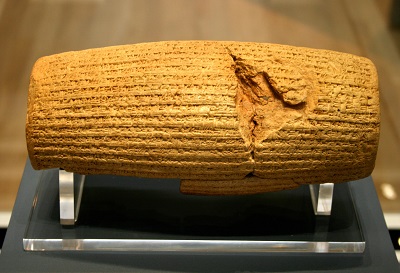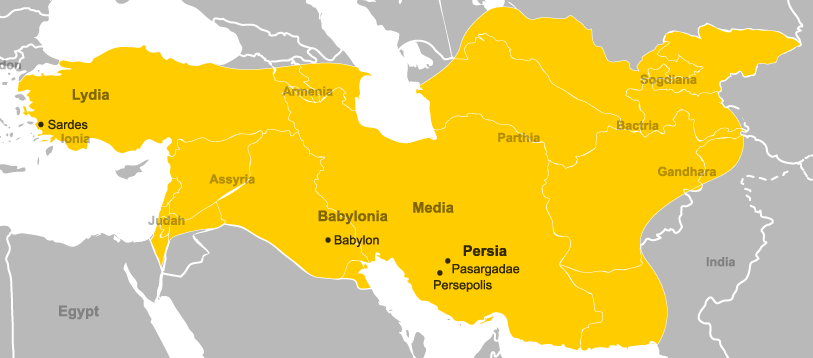Those who recollect the description of Babylon and its surrounding territory, will not be surprised to learn that the capture of it gave the Persian aggressor much trouble.
Continuing Cyrus Begins the Persian Empire,
our selection from A History of Greece by George Grote published in 1856. For works benefiting from the latest research see the “More information” section at the bottom of these pages. The selection is presented in seven easy 5 minute installments.
Previously in Cyrus Begins the Persian Empire.
Time: 600 – 530 BC
Place: Near East

CC BY-SA 4.0 image from Wikipedia.
There was something in the main facts of the history of Croesus profoundly striking to the Greek mind, a king at the summit of wealth and power — pious in the extreme and munificent toward the gods — the first destroyer of Hellenic liberty in Asia — then precipitated, at once and on a sudden, into the abyss of ruin. The sin of the first parent helped much toward the solution of this perplexing problem, as well as to exalt the credit of the oracle, when made to assume the shape of an unnoticed prophecy. In the affecting story of Solon and Croesus, the Lydian king is punished with an acute domestic affliction because he thought himself the happiest of mankind — the gods not suffering any one to be arrogant except themselves; and the warning of Solon is made to recur to Croesus after he has become the prisoner of Cyrus, in the narrative of Herodotus. To the same vein of thought belongs the story, just recounted, of the relations of Croesus with the Delphian oracle. An account is provided, satisfactory to the religious feelings of the Greeks, how and why he was ruined — but nothing less than the overruling and omnipotent Moerae could be invoked to explain so stupendous a result. It is rarely that these supreme goddesses — or hyper-goddesses, since the gods themselves must submit to them — are brought into such distinct light and action. Usually they are kept in the dark, or are left to be understood as the unseen stumbling block in cases of extreme incomprehensibility; and it is difficult clearly to determine (as in the case of some complicated political constitutions) where the Greeks conceived sovereign power to reside, in respect to the government of the world. But here the sovereignty of the Moerae, and the subordinate agency of the gods, are unequivocally set forth. The gods are still extremely powerful, because the Moerae comply with their requests up to a certain point, not thinking it proper to be wholly inexorable; but their compliance is carried no farther than they themselves choose; nor would they, even in deference to Apollo, alter the original sentence of punishment for the sin of Gyges in the person of his fifth descendant — sentence, moreover, which Apollo himself had formerly prophesied shortly after the sin was committed, so that, if the Moerae had listened to his intercession on behalf of Croesus, his own prophetic credit would have been endangered. Their unalterable resolution has predetermined the ruin of Croesus, and the grandeur of the event is manifested by the circumstance that even Apollo himself cannot prevail upon them to alter it, or to grant more than a three years’ respite. The religious element must here be viewed as giving the form, the historical element as giving the matter only, and not the whole matter, of the story. These two elements will be found conjoined more or less throughout most of the history of Herodotus, though as we descend to later times, we shall find the latter element in constantly increasing proportion. His conception of history is extremely different from that of Thucydides, who lays down to himself the true scheme and purpose of the historian, common to him with the philosopher — to recount and interpret the past, as a rational aid toward pre-vision of the future.
In the short abstract which we now possess of the lost work of Ctesias, no mention appears of the important conquest of Babylon. His narrative, indeed, as far as the abstract enables us to follow it, diverges materially from that of Herodotus, and must have been founded on data altogether different.
Continued below the map.

CC BY-SA 3.0 image from Ancient History Encyclopedia.
“I shall mention (says Herodotus) these conquests which gave Cyrus most trouble, and are most memorable: after he had subdued all the rest of the continent, he attacked the Assyrians.” Those who recollect the description of Babylon and its surrounding territory, will not be surprised to learn that the capture of it gave the Persian aggressor much trouble. Their only surprise will be, how it could ever have been taken at all — or indeed how a hostile army could have even reached it. Herodotus informs us that the Babylonian queen Nitocris (mother of that very Labynetus who was king when Cyrus attacked the place) apprehensive of invasion from the Medes after their capture of Nineveh, had executed many laborious works near the Euphrates for the purpose of obstructing their approach. Moreover there existed what was called the wall of Media (probably built by her, but certainly built prior to the Persian conquest), one hundred feet high and twenty feet thick, across the entire space of seventy-five miles which joined the Tigris with one of the canals of the Euphrates: while the canals themselves, as we may see by the march of the ten thousand Greeks after the battle of Cunaxa, presented means of defense altogether insuperable by a rude army such as that of the Persians. On the east, the territory of Babylonia was defended by the Tigris, which cannot be forded lower than the ancient Nineveh or the modern Mosul. In addition to these ramparts, natural as well as artificial, to protect the territory — populous, cultivated, productive, and offering every motive to its inhabitants to resist even the entrance of an enemy — we are told that the Babylonians were so thoroughly prepared for the inroad of Cyrus that they had accumulated within their walls a store of provisions for many years. Strange as it may seem, we must suppose that the king of Babylon, after all the cost and labor spent in providing defenses for the territory, voluntarily neglected to avail himself of them, suffered the invader to tread down the fertile Babylonia without resistance, and merely drew out the citizens to oppose him when he arrived under the walls of the city — if the statement of Herodotus is correct. And we may illustrate this unaccountable omission by that which we know to have happened in the march of the younger Cyrus to Cunuxa against his brother Artaxerxes Mnemon. The latter had caused to be dug, expressly in preparation for this invasion, a broad and deep ditch (thirty feet wide and eight feet deep) from the wall of Media to the river Euphrates, a distance of twelve parasangs or forty-five English miles, leaving only a passage of twenty feet broad close alongside of the river. Yet when the invading army arrived at this important pass, they found not a man there to defend it, and all of them marched without resistance through the narrow inlet.
| <—Previous | Master List | Next—> |
More information here and here, and below.
We want to take this site to the next level but we need money to do that. Please contribute directly by signing up at https://www.patreon.com/history
423737 47134You produced various very good points there. I did a search on the topic and discovered a lot of people will have the same opinion together with your weblog. 622443